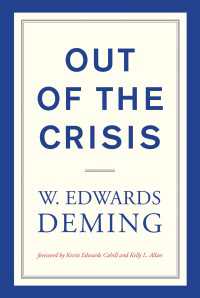- ホーム
- > 洋書
- > 英文書
- > Cinema / Film
Full Description
David Lean's extraordinary films work philosophically through the modern reproductive and transportive technologies of sight and sound: through trains, planes, ships, and automobiles, from one perspective, and through the modern technology of the radio and gramophone, from another.
Lean's musical motifs are known worldwide: Lara's theme in Zhivago; the Colonel Bogey March in Kwai; Estella's motif in Great Expectations; Rosy's motif in Ryan's Daughter; Lawrence's motif for his adventure in Arabia, and of course Rachmaninoff's pounding chords in Brief Encounter. When, however, Lean described his cutting of pictures as akin to how music flows through pictures, what sort of music or musicality had he in mind: a classical or popular music, or a way of using musical form to mix up the meaning and material of his films?
Lydia Goehr's new book tracks the soundscape in Lean's films not only through the musical scores composed for the films, but also, and more, through the technology of radio and gramophone that, at the start of Lean's career, were becoming indispensable household items for the home. The book begins and ends with a motif running from the early more domestic films locally situated in the English home to the later more extensive epics of colony, commonwealth, and empire. The fidelity-infidelity relationship defined by marriage extends to the loyalty-betrayal relationship regarding countries of war and peace—after which this relationship is extended to the witty British manner of making film as a perfected and not so perfected symphonic work of a great cutter's art. Here, as few other books on Lean have emphasized, the influence of Noel Coward on Lean cannot be overestimated.
Contents
Preface
1. Making the Cut by Musical Means: Introduction to the Films of David Lean
2. Beethoven and Bust: This Happy Breed (1944), Ryan's Daughter (1970)
3. Rachmaninoff on Record: Blithe Spirit (1945), Brief Encounter (1945)
4. Concerto for all Hands: In Which We Serve (1942), Brief Encounter (1945)
5. Of Craft and Craftiness: Great Expectations (1946), Oliver Twist (1948)), Hobson's Choice (1954)
6. Dream Vacations and Souvenirs: The Passionate Friends (1949), Summer Madness (1955)
7. Trials of Home and Hard Labor: Madeleine (1950), The Sound Barrier (1952), The Bridge over the River Kwai (1957)
8. Myths, Gifts, and Echoes: Lawrence of Arabia (1962), Doctor Zhivago (1965), A Passage to India (1984)
Bibliography
Index
-

- 洋書電子書籍
- E.デミング『危機からの脱出』(再刊)…
-

- 電子書籍
- はじめての人工知能 増補改訂版 Exc…






